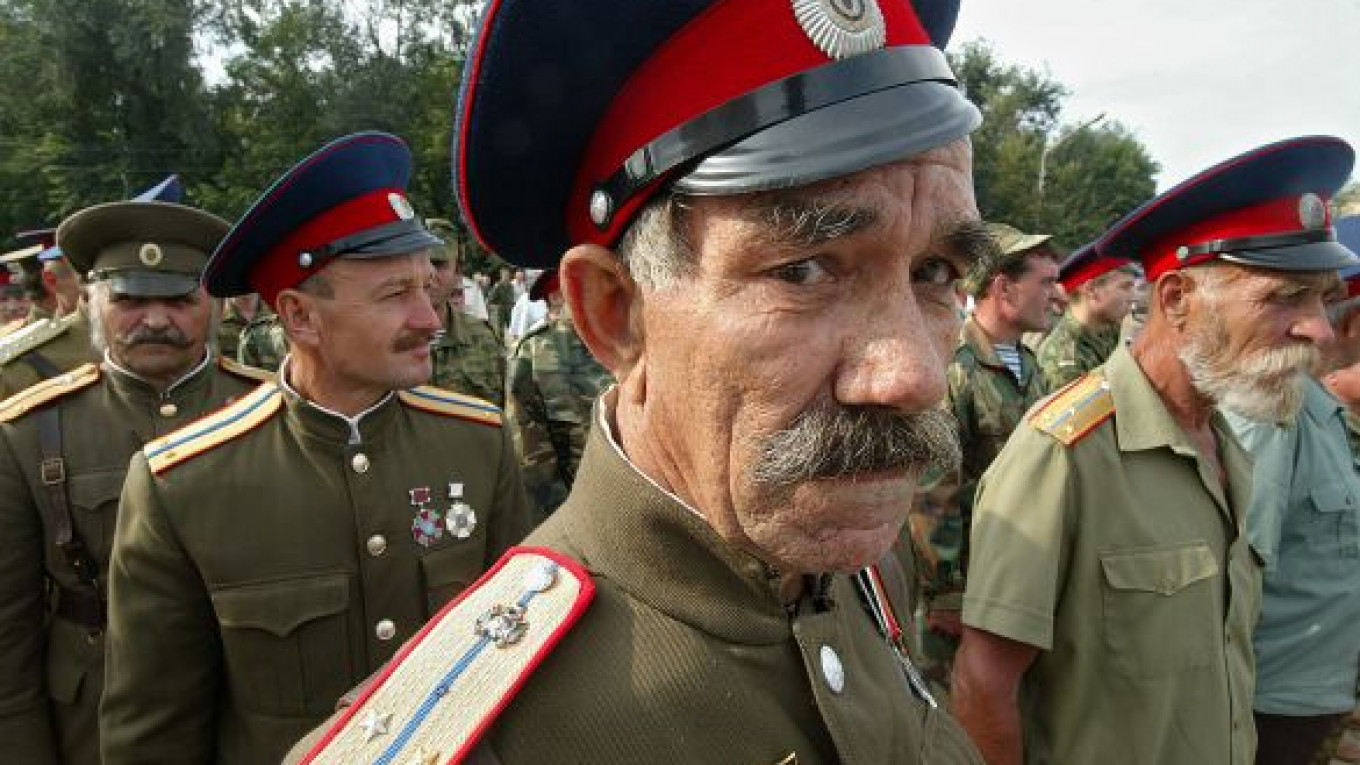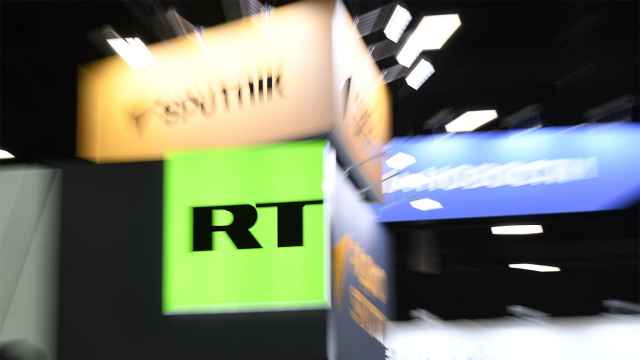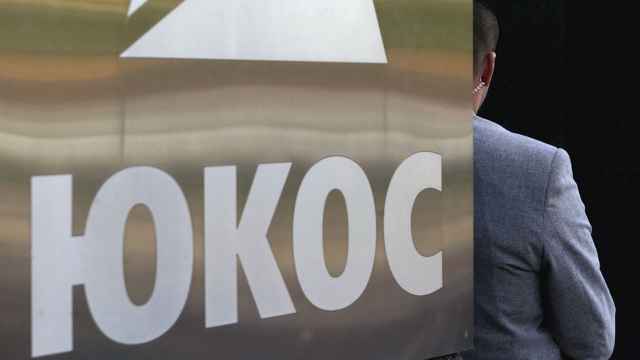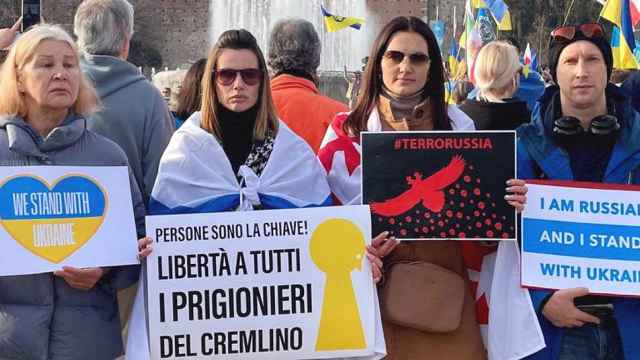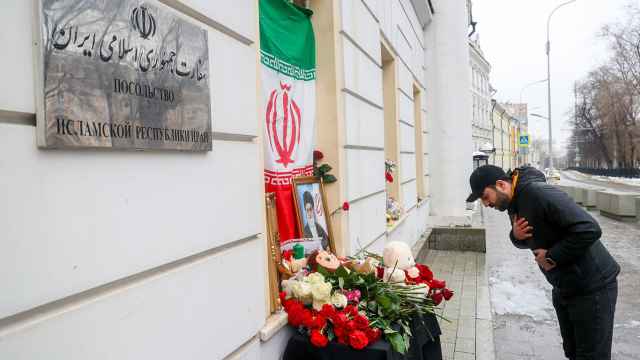A pair of modern-day Cossacks begins their patrol at 8 p.m. on a cool September evening. They're on the lookout for lawbreakers: drunks, drug addicts, youths out after curfew — anybody disturbing the peace in Lyublino, a quiet residential district in southeast Moscow.
Andrei Pichugin and Nikolai Vladimirtsev, self-styled descendants of the tsar's fearsome horsemen, wear snappy blue uniforms and polished black shoes. Pichugin periodically doffs a peaked service cap during the three-hour foot patrol, revealing a glistening crown of sweat.
Vladimirtsev, 22, is baby-faced and soft-spoken. His day job is photographer at local sports events. Pichugin, 23, short and squat, is in law school. The two met as undergraduates.
"People like to ask us, 'Where's your horse? Where's your sword?'" Pichugin says, passing a group of teenagers drinking beer on the hood of a parked car in an otherwise empty courtyard. One teenager, oblivious to or undeterred by the Cossacks' red and silver shoulder patches, gives a derisive whistle.
The men keep walking. The hood of a car is considered "indoors," Vladimirtsev said. It's legal.
In dozens of cities across Russia, people like Pichugin and Vladimirtsev, members of state-registered Cossack organizations, are increasingly assuming low-level security functions previously reserved for the police, typically patrolling after dark and sometimes securing demonstrations.
The men are unarmed, except for an occasional Cossack saber, and are legally forbidden to do anything except prevent a crime in progress and alert the police. They cannot take suspects into police custody, but merely hold them still until the police arrive.
Nevertheless, as Cossacks' numbers and ambitions grow, they've been raising eyebrows from locals and activists who see in them the rise of a pro-Kremlin paramilitary force, unbound by law, waiting to be sicced on enemies of the state, just like their ancestors were.
Those fears appeared to be confirmed in August, when Krasnodar Governer Alexander Tkachyov announced a plan to hire Cossacks to help police target illegal migrants — mostly from Russia's Muslim southern flank — to crack down on crime and maintain the region's racial balance.
"We'll squeeze them out, create order, ask for documents and enforce immigration rules: 'Where are you from? Why?' etc.," Tkachyov told a gathering of police officers. "I'm confident that there's no other option."
Under the plan, Cossack watchmen would receive additional police powers and, for the first time, a salary.
The speech sparked outrage from rights activists, who accused Tkachyov of inflaming ethnic tensions. Alexander Sokolov, a member of the Public Chamber, asked the prosecutor general to check the remarks for evidence of illegal extremism.
Experts interviewed by The Moscow Times described the Cossack movement as part of a Kremlin-guided revival that began in the waning days of the Soviet Union and has continued piecemeal into the present, with Cossacks coming increasingly under the Kremlin's control.
•••
Official estimates of Russia's Cossack population vary. A 2002 nationwide census found 140,000 Cossacks, but the true number is currently closer to 7 million, according to Alexander Beglov, chairman of the presidential council on Cossack affairs.
That would make Cossacks the country's second largest "ethnic" group behind Russians and ahead of Tatars. (Cossacks were listed as a subethnicity of Russian in 2002 and a separate ethnicity in the 2010 census.)
Since the late 1980s, the government has co-opted Cossacks, a historically separatist ethnicity, by redefining them as a social group loyal to the government, said Marina Ryblova, a Cossacks expert at the Russian Academy of Sciences in Rostov-on-Don.
The government defines a Cossack as anybody who joins a Cossack organization and carries out government service, and in 1995, it established a register of organizations that excluded fringe groups.
"The state's job is to help the Cossacks, to draw them to military service and military-patriotic education for children," Vladimir Putin wrote in an extensive article on nationalities in Russia during his presidential campaign in February.
Today, 426 registered Cossack organizations have a combined 936,000 members, according to the Federal Drug Control Service, which conducts anti-drug operations with 100 of them. At the top of the hierarchy are 11 organizations, known misleadingly as "armies," that bring together smaller regional and local groups.
"There are people dressed in Cossack uniforms, but there aren't any Cossack armies, as in real military organizations," Rublyova said.
The functions of the Cossack organizations range from sponsoring local sporting events and participating in Victory Day parades to organizing patriotic and spiritual programs. There are also 30 schools for Cossack cadets, which prepare children for military service.
The local Cossack society in southeast Moscow that counts Pichugin and Vladimirtsev as members is part of the Central Cossack Army, which has the distinction of being the only army whose leader, or ataman, is not also a state official.
The other atamans include a State Duma deputy, a deputy governor and two high-ranking regional advisers. By law, atamans are approved by the president, who also presides over the presidential council on Cossack affairs. Council members include major Cossack leaders and key state officials such as Deputy Prime Minister Dmitry Rogozin, who oversees the defense industry.
•••
Hour three of the patrol. No trouble so far; the playgrounds are empty and dark. Pichugin points to his old school, a squat, geometric structure that looks like a failed game of Tetris. He pops into three grocery stores, hunting for a 1-liter bottle of Coca-Cola.
For Pichugin and Vladimirtsev, the horseless horsemen of Lyublino, being a Cossack is about patriotism. "A Cossack is an upstanding person who loves his motherland," Pichugin says. "A patriot loves his motherland in words only, but a Cossack does in his actions. Always in his actions.
"We want to change something with own hands. For our apartment building, for our own region," he says. "We want kids to grow up playing sports instead of drinking."
The men say they're satisfied with the government of Vladimir Putin and have no problem with opposition protests as long as protesters follow the law. "People have the freedom to express themselves," Pichugin says.
A reporter broaches the subject of Pussy Riot, the punk band that made international headlines when three members were jailed for an anti-Putin performance in a Moscow church.
Pichugin chuckles. "They shouldn't have sent Pussy Riot to prison. They should have lowered their trousers and taken a switch to their backsides. That's the Cossack way."
He looks both ways and crosses the street, now illuminated by streetlamps alone.
•••
In Krasnodar, a city in the heart of Cossack country 1,200 kilometers south of Moscow, Maxim Petrenko sees illegal migrants selling drugs to children, girls smoking cigarettes, the occasional "depraved" rock-and-roll concert, and a new, unofficial marriage registry for gays — and he doesn't like it.
Petrenko, a local nationalist leader, said influence from the West and migrants from the East are weakening Slavs' grip on the Kuban, the Cossacks' homeland, which includes the Krasnodar, Adygea and Karachay-Cherkessia regions and parts of the Stavropol region.
He said it's about control, not racism, which he renounces. "Every nation should have a territory where its interests come first. … Russians should feel that they are the masters of their land," he said by telephone, echoing comments made by Governor Tkachyov.
Petrenko thinks that the Cossack "moral police" are the answer. Regular police are bound by regulations and rules of conduct that limit their authority to the letter of the law, he said.
"I can grab a rude man by his little elbow and take him outside for a Cossack chat, without violence, just lay things out for him. … A police officer will say, 'What's going on? There's nothing in the law about how he should act,'" Petrenko said.
On Sept. 1, their first day on the job, Cossack watchmen in the city of Krasnodar detained more than 100 "lawbreakers," including three people wanted by the police, and returned 35 minors out past curfew to their families, the local Yuga.ru news portal reported.
The mayor immediately announced plans to boost their numbers from 150 to 250 in October. Under his plan, which will cost the region about 650 million rubles ($20.5 million) per year, Cossack patrollers will receive a monthly salary of 20,000 to 25,000 rubles ($635 to $780), about the salary of a police officer, Tkachyov said.
Semyon Simonov, who monitors migrants' rights for watchdog Memorial in Sochi, described Tkachyov's proposal as a dangerous populist ploy.
"Maybe after the floods in Krymsk, it was an attempt to improve his image among people who are upset about immigration," he said. "Tkachyov is that kind of person. This is his essence. He's made similar declarations before, such as saying that certain last names should be illegal."
Cossacks are the main nationalist force in the Krasnodar region and have held that status for years, Simonov said. In the mid-2000s, they helped authorities evict thousands of Muslim Meskhetian Turks, many of whom resettled in the United States as refugees.
Simonov said it's not uncommon for local Cossacks to hold anti-Roma and anti-Semitic views.
"I think bringing people with these convictions to maintain public order is generally dangerous and could become a reason for an interethnic conflict," he said by telephone. "Nationalists are getting ready to join these units and participate in raids."
Ironically, the government's demand for laborers to build infrastructure for the 2014 Winter Olympics has been a significant draw for migrants, Simonov said.
Petrenko, the local nationalist leader, is an assistant to Liberal Democratic Party heavyweight and Duma Deputy Vladimir Ovsyannikov and is himself running for a seat in the regional legislature.
•••
Pichugin points to a wide gap in the skyline, interrupted by billowing smokestacks, rotund storage tanks and tangles of pipes. That's the largest oil refinery in Moscow, he says. It fuels the entire city.
They walk to a cluster of high-rise apartments on the edge of town, through a swamp that Vladimirtsev calls "a forest." The air smells like rotten eggs and car exhaust.
"That's Lyublino smelling like Lyublino," Pichugin jokes.
For Cossack leaders, political conservatism trumps Cossack ancestry when it comes to determining who's a Cossack and who's just wearing a sheepskin hat in public.
"The government sees Cossacks, first and foremost, as a group inclined toward patriotism," said Olga Rvacheva, who studies modern Cossacks at the Russian Academy of Sciences.
Beglov, the chairman of the presidential council on Cossack affairs, said in an interview with Ekho Moskvy radio last year that a Cossack is anybody who feels like a Cossack and follows "centuries-old" rules and traditions.
"Orthodox Christianity is one of the signs of a true Cossack," he said, adding that Cossacks have "always supported the laws of the state, the fatherland and the Orthodox Church."
Patriarch Kirill told the presidential council in 2009 that Cossacks have always kept alive the flame of patriotism, faith in the church and a readiness to sacrifice themselves for their values.
Pichugin and Vladimirtsev, the Lyublino watchmen, are therefore Cossacks by Beglov's definition. Pichugin's closest Cossack relative is an ancestor who fought in the Russo-Turkish war of the late 1870s. Vladimirtsev's grandfather had Cossack blood.
The traditions were lost during the Soviet era, they said, so they're starting from scratch, learning to wield the Cossack saber, or shashka, in the hope of resurrecting an idea of true Russianness that seems more desirable than any modern alternative.
The Orthodox Church and Cossacks, "manly men standing guard on frontiers," are symbols of authentic "Russianness" that have been used to reconstruct Russia's post-Soviet national identity, said Shane O'Rourke, a professor at the University of York and author of "The Cossacks," a history of the military caste.
But the idea that Cossacks have always been loyal defenders of church and state, as officials often claim, is a lie, he said.
"All the great rebellions against the Russian state before 1905 were led by Cossacks. That's what made the Cossacks dangerous," he said.
Furthermore, while Cossacks were exceptionally loyal and lethal against foreign enemies, many rebelled when asked to attack anti-government protesters in 1905.
Cossacks' ethnic purity and historical loyalty to the Orthodox Church also appear to be politically motivated inventions. Cossacks often mixed with the people they were supposed to be fighting; many were Old Believers, and some were even Buddhists, O'Rourke said.
The very word "Cossack" is a Turkish word meaning a warrior or brigand, he said.
None of this stops some modern-day nationalists, often less affable than Pichugin and Vladimirtsev, from taking up the Cossack banner in defense of the Kremlin and the Orthodox Church.
Men in Cossack uniform were spotted at pro-Putin events from Moscow to Vladivostok in the run-up to March elections. In April, a group of them pounced on pro-Pussy Riot demonstrators in Krasnodar, seizing posters and tearing them to shreds.
"We must show how we feel about these morons' pranks," said Nikolai Doluda, ataman of the Donskoi Army and deputy governor of Krasnodar, referring to Pussy Riot's February performance in Moscow's Christ the Savior Cathedral.
In Ukraine, Cossack activists recently nailed shut the door to the office of Femen, the feminist group known for topless protests against the Orthodox Church, the Ukrainian government and other causes. On another occasion, Cossacks provoked a bloody melee with riot police who prevented them from raising a large cross, without permission, on the outskirts of Feodosia, in Crimea.
"Aggressive nationalism in Cossack circles is a very complicated question. There's no way around it," said Sergei Balakleyev, editor-in-chief of the magazine Kazaki v Edinstve (Cossacks United). "There have been excesses, unworthy behavior, in my personal opinion."
Nationalist Cossack groups tend not to register with the government or the Union of Russia Cossacks, and Balakleyev refused to estimate their numbers, arguing that the vast majority of Cossacks are mainstream patriots, eager to defend their land, faith and family.
•••
Some Cossacks believe that Cossack watchmen might become part of a new government security agency or replace the police entirely.
"People trust us more than they trust the police," said Igor Gulichev, a Cossack colonel in southeast Moscow. "They give us tips that they wouldn't give the police, who we all know suffer from corruption. I wouldn't rule out taking their place one day."
Even some top officials in the troubled North Caucasus, the site of a simmering Islamist insurgency, have proposed forming irregular armed units to fight militants, said Alexei Vlasov, head of the Post-Soviet Studies Center at Moscow State University.
Officially, there are no plans to replace the police with Cossacks, and earlier this month, a Moscow police spokesman dismissed a loaded suggestion by the ataman of the Central Cossack Army that the police might be incapable of maintaining order.
"Cossacks who want to take part in securing our streets can join the police force," the spokesman said, adding that Cossack recruits would have to undergo training and pass tests for physical and mental fitness, just like everybody else.
Experts also doubted that Cossack units would have the strength or the inclination to face down mass opposition protests anytime soon.
"I assure you that they can't disperse a crowd in their current form," said Ryblova, of the Russian Academy of Sciences. "They're extremely few in number, they don't have weapons, they're poorly trained, and if you were to attack them, they wouldn't be able to defend themselves."
Vlasov said nobody was trying to use Cossack watchmen to suppress demonstrations.
"I see them, above all, as part of a fight against petty criminal elements and a way of preventing young people from brawling," he said.
Pichugin takes a gulp of Coca-Cola, then he and Vladimirtsev turn the corner and make for the metro station, chatting animatedly.
The patrol was a quiet one, not a single lawbreaker apprehended, but the men don't seem disappointed as it comes to a close. They've taken their communities into their own hands. They've done their duty as men. And in their eyes, they've done their duty as Cossacks.
Related articles:
A Message from The Moscow Times:
Dear readers,
We are facing unprecedented challenges. Russia's Prosecutor General's Office has designated The Moscow Times as an "undesirable" organization, criminalizing our work and putting our staff at risk of prosecution. This follows our earlier unjust labeling as a "foreign agent."
These actions are direct attempts to silence independent journalism in Russia. The authorities claim our work "discredits the decisions of the Russian leadership." We see things differently: we strive to provide accurate, unbiased reporting on Russia.
We, the journalists of The Moscow Times, refuse to be silenced. But to continue our work, we need your help.
Your support, no matter how small, makes a world of difference. If you can, please support us monthly starting from just $2. It's quick to set up, and every contribution makes a significant impact.
By supporting The Moscow Times, you're defending open, independent journalism in the face of repression. Thank you for standing with us.
Remind me later.


